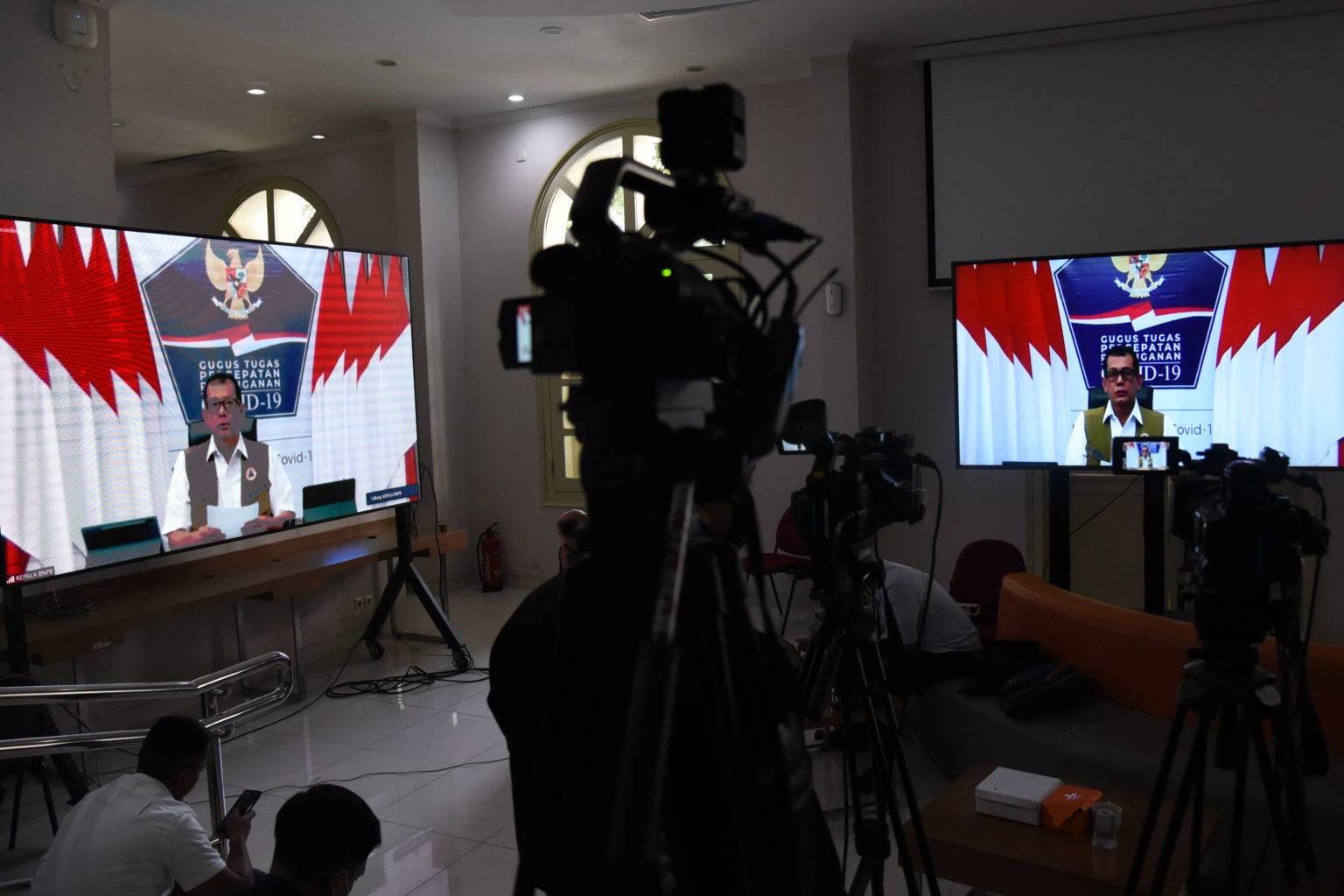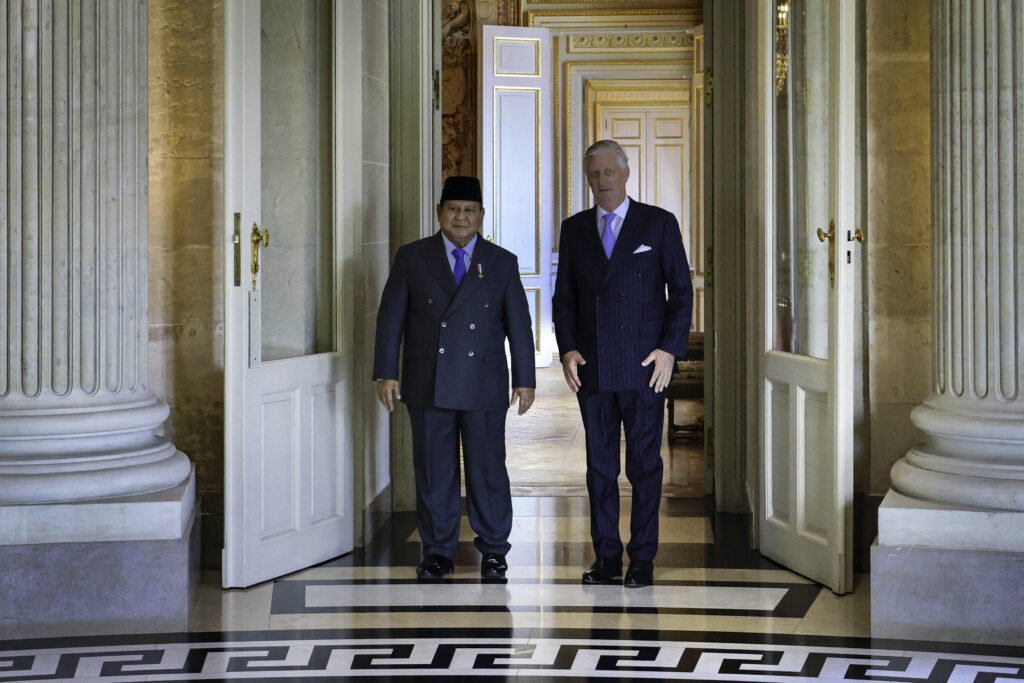COVID-19 Task Force Chief: ‘Green Zones’ Status Depends on Regional Governments’ Preparedness

Chief of the COVID-19 National Task Force Doni Monardo delivers his press statement after attending a Limited Cabinet Meeting, Thursday (4/6). (Photo by: Public Relations / Rahmat).
Regions with a declining rate of COVID-19 cases will be categorized as “green zones” through coordination between regents or mayors with various community leaders, Chief of the COVID-19 National Task Force Doni Monardo has said.
“There are stages that must be passed through by regional heads, including coordination and consultation with religious leaders, epidemiologists, and regional media in their respective regions,” Doni said during a press conference on Thursday (4/6).
He went on to say that the Central Government gives the authority to regional governments to decide the right time to reopen their regions and supports their effort to protect their regions. However, regional heads should also take into account the potential for people to lose their jobs.
On that occasion, Doni said that the President has requested for involvement of the private sector in order to increase the number of testing target from 10,000 to 20,000 or 30,000 samples per day.
“Every step taken should be integrated through the Provincial Health Office. So, the issue of permit, existing provisions, and safety must be taken into account, considering that laboratory staff may have the same COVID-19 risks as doctors and nurses,” Doni said.
Some time ago, he had explained that there were several doctors and laboratory staff who contracted COVID-19.
“We should protect our doctors, nurses, and laboratory staff so that they will not become victims of COVID-19 or be at risk due to non-optimal system,” Doni added.
The Task Force, he continued, together with Ministry of Health under the guidance of Coordinating Minister for Human Development and Culture will always take into account all aspects, including medical personnel’s safety.
Regarding reagents supply, Doni said that the supply is still adequate. In total, there are around 1.1 million reagents for Polymerase Chain Reaction (PCR) test, Viral Transport Media (VTM), and ribonucleic acid (RNA) extraction.
“The reagents supply will begin to decrease in the next few weeks. However, we can procure more reagents through cooperation with other countries,” Doni stated.
According to him, a number of private companies have been trying to obtain more reagents supply that can be combined. In the middle of April, the country ran out of reagents stock, yet we can still meet the demand of reagents.
On the massive testing, he said that it will depend on the level of positive confirmed cases report.
“For that reason, we are increasing the number of mobile Biosafety Level-2 (BSL-2) laboratories that can be rolled out to many regions so it will be far more efficient,” he said.
Regarding the budget, Doni said that the joint team of Health Ministry and the Task Force is still arranging the total budget to prepare everything related to massive testing.
“For your information, the first mobile laboratory is only available at the Health Research and Development Agency (Balitbangkes). Afterwards, it was expanded to several more locations, including the Airlangga Laboratory, Eijkman Institute, and the University of Indonesia. The laboratory is also developed in various regions. To date, the number of the laboratory is getting bigger,” Doni said.
On that occasion, he also said that the real-time scoring of a basic reproduction number (R0) of COVID-19 can make more accurate data collection. However, the Task Force and the expert team from each province are encouraged to conduct the protocol in accordance with indicators of the World Health Organization (WHO), which includes epidemiological aspects, surveillance aspects, and the preparedness of public health facilities.
In addition, more confirmed cases will be found if massive testing conducted immediately, as in East Java province.
“The number of PCR machines and the ability of regions to trace people under surveillance (ODP) and people without COVID-19 symptoms (OTG) has increased, bringing the total of confirmed cases has also increased. We have to pay attention to the number of hospitals and fatalities,” he said.
On that occasion, he also expressed his hope that those who had recovered from COVID-19 are willing to donate their plasmas.
“In East Java province, we also appeal 699 recovered patients to donate their plasmas. To all our citizens and society who have recovered, to be willing to donate their blood plasma to health offices,” he explained.
This, he added, is the form of mutual assistance that can be carried out since the vaccine has not been discovered yet. Ministry of Health has claimed to treat patients using COVID-19 survivors’ plasma (convalescent plasma). The treatment method has also been recognized by several international institutions.
“We continue to encourage our experts, medical experts, so there are more health experts have capabilities to undergo this plasma method therapy,” Doni said. (MAY / EN)
Translated by: Syarifah Aisyah
Reviewed by: Mia Medyana








